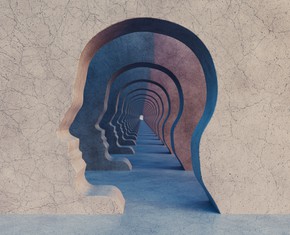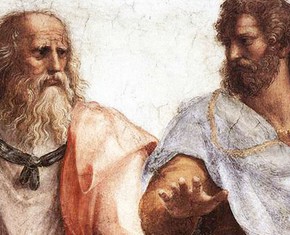The views expressed in our content reflect individual perspectives and do not represent the authoritative views of the Baha'i Faith.
When the Enlightenment occurred in the 18th century, much of humanity moved into an era of rationality and science – which also diminished the role of religion and the meaning it offers.
The Frankfurt School philosophers Max Horkheimer and Theodor W. Adorno recognized that meaning had become a casualty of the process of Enlightenment, saying “On their way toward modern science human beings have discarded meaning.”
RELATED: Does Critical Theory Contradict Religious Belief?
Unfortunately, this loss of meaning in modern society has allowed the tools of reason and science to be deployed in a pitiless and cynical manner against humanity.
In the Enlightenment’s assault on superstition and religion, any pretense of objective morality has perished with it. The ominous consequences of this were foreshadowed in the famous words of Nietzsche: “God is dead. God remains dead. And we have killed him. How shall we comfort ourselves, the murderers of all murderers?” The effect is such that the souls of humanity have become disenfranchised and alienated against each other.
Religion as a Tool for Human Liberation
Shoghi Effendi, the Guardian and head of the Baha’i Faith until his passing in 1957, elaborated on Baha’u’llah’s critique of Western civilization, making an interestingly parallel observation around the same time as Adorno and Horkheimer. In his book Citadel of Faith he attributed the catastrophic moral failings of both Marxist and capitalistic societies to materialism, which the Baha’i teachings call “a devouring flame:”
… an evil which the nation, and indeed all those within the capitalist system, though to a lesser degree, share with that [Soviet] state and its satellites regarded as the sworn enemies of that system — is the crass materialism, which lays excessive and ever-increasing emphasis on material well-being, forgetful of those things of the spirit on which alone a sure and stable foundation can be laid for human society. It is this same cancerous materialism, born originally in Europe, carried to excess in the North American continent, contaminating the Asiatic peoples and nations, spreading its ominous tentacles to the borders of Africa, and now invading its very heart, which Baha’u’llah in unequivocal and emphatic language denounced in His Writings, comparing it to a devouring flame and regarding it as the chief factor in precipitating the dire ordeals and world-shaking crises that must necessarily involve the burning of cities and the spread of terror and consternation in the hearts of men.
In this context, materialism refers not only to the modern hunger for money and material possessions, but also to the branch of philosophy that sees matter as the fundamental substance in nature, and believes in only that which the senses can perceive. This denial of the spiritual realities in existence occurred as the natural outgrowth of the collapse of traditional religious authority under the rational scrutiny of the Enlightenment and science. Certainly that collapse was made possible because the old religious traditions were riddled with superstition, dogma, literalism, and their own form of materialism.
There is some agreement between this view and the Frankfurt School’s, though they would attribute the downfall of religion to its inherent rational failings. Indeed, Marcuse’s concept of “radical subjectivity” is reminiscent of Baha’u’llah’s seemingly opposite call for radical objectivity in the opening verse of his Book of Certitude, where he predicates “true understanding” on being “detached from all that is in heaven and on earth,” or in The Hidden Words, his call to see “with thine own eyes and not through the eyes of others.” Both “radical subjectivity” and radical objectivity require questioning and being detached from one’s cultural and social norms – in fact, they require the unbiased, scientific, independent investigation of the truth, one of the primary principles of Baha’u’llah’s Faith.
Being Marxist, the Frankfurt school philosophers rejected religion, viewing it as part of the tools of power and domination utilized by the ruling class. To the Frankfurt School philosophers, like the majority of Enlightenment thinkers, religion represented the source of many of the major problems of society. Much of the social structures rooted in religion were what Critical Theory was created to challenge. For example, these scholars argued that while perhaps in the past rules of sexual morality served a valuable societal function, the progress of science — especially the advent of birth control — made it no longer relevant.
RELATED: Religious Truth and Laws: Relative, Not Fixed
Contrary to this materialist view, Baha’is see religion as one of the most powerful liberating tools of human civilization. Baha’u’llah explained: “True liberty consisteth in man’s submission unto My commandments, little as ye know it,” and further, “Religion is verily the chief instrument for the establishment of order in the world and of tranquility amongst its peoples.” Baha’is view religion as a force that —when freed from literalism, mindless dogma, and superstition — can moderate dehumanizing forces and infuse the masses of humanity with morality and meaning. Thus, Abdu’l-Baha predicted:
When religion, shorn of its superstitions, traditions, and unintelligent dogmas, shows its conformity with science, then will there be a great unifying, cleansing force in the world which will sweep before it all wars, disagreements, discords and struggles — and then will mankind be united in the power of the Love of God.
On one level, Baha’is agree in principle with the practice of Critical Theory: that of challenging assumptions and definitions of social discourse that no longer serve humanity. Yet in many cases their conclusions are the polar opposite of the practitioners of Critical Theory. For example, while the use of the arts is acknowledged by both as a powerful tool in moving human consciousness, the Baha’i teachings describe the moderating influence of religion as an even greater and more lasting tool.
From the time of the Bab and Baha’u’llah to the present-day, Baha’is have engaged in what might be seen as a type of Critical Theory when dealing with the assumptions and norms of contemporary society. For example, the internationally-elected administrative body of the worldwide Baha’i community, The Universal house of Justice, explained in a March 2017 letter:
The vision of Baha’u’llah challenges many of the assumptions that are allowed to shape contemporary discourse — for instance, that self-interest, far from needing to be restrained, drives prosperity, and that progress depends upon its expression through relentless competition. To view the worth of an individual chiefly in terms of how much one can accumulate and how many goods one can consume relative to others is wholly alien to Baha’i thought. But neither are the teachings in sympathy with sweeping dismissals of wealth as inherently distasteful or immoral, and asceticism is prohibited. Wealth must serve humanity. Its use must accord with spiritual principles; systems must be created in their light …
In the next and final article of this series, we will examine the practice of Critical Race Theory in light of the Baha’i teachings.
















Comments
Sign in or create an account
Continue with Googleor